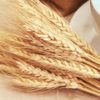Tuesday, April 7, 2020 | 13th Nissan 5780 Please join us for a series of weekly online conversations: “After the Plague: An Omer Conversation Series.” Our first call is noon ET this Sunday with Yossi Abramowitz and Rabbi Susan Silverman. Join us on Facebook Live on Hazon’s Facebook page. Learn more. Dear All, There’s an old chasidic story about someone who fears that the angel of death is coming for them, at a particular place and a particular time. Quickly they change their plans. They go to a different village… and then of course the angel of death is right there, in that different village, waiting to meet them, exactly at the appointed time. And the message of the story: when our time is up, our time is up. I wish for all of us long life, for sure. But it’s not unhelpful to be reminded of our mortality. For most of human history we knew that we were vulnerable, we saw death. We lived without penicillin. Women died far more frequently in childbirth. We died of polio and malaria, we died when the wrong flea bit us, we died of an abscess or a ruptured appendix. Only when I was writing a hesped for […]















